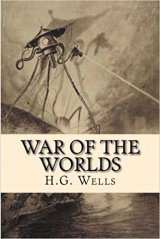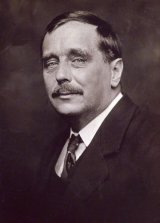The War of the Worlds Page #20
The War of the Worlds is a science fiction novel by English author H. G. Wells first serialised in 1897 by Pearson's Magazine in the UK and by Cosmopolitan magazine in the US.
The church bells were ringing for evensong, and a squad of Salvation Army lassies came singing down Waterloo Road. On the bridge a number of loafers were watching a curious brown scum that came drifting down the stream in patches. The sun was just setting, and the Clock Tower and the Houses of Parliament rose against one of the most peaceful skies it is possible to imagine, a sky of gold, barred with long transverse stripes of reddish-purple cloud. There was talk of a floating body. One of the men there, a reservist he said he was, told my brother he had seen the heliograph flickering in the west. In Wellington Street my brother met a couple of sturdy roughs who had just been rushed out of Fleet Street with still-wet newspapers and staring placards. "Dreadful catastrophe!" they bawled one to the other down Wellington Street. "Fighting at Weybridge! Full description! Repulse of the Martians! London in Danger!" He had to give threepence for a copy of that paper. Then it was, and then only, that he realised something of the full power and terror of these monsters. He learned that they were not merely a handful of small sluggish creatures, but that they were minds swaying vast mechanical bodies; and that they could move swiftly and smite with such power that even the mightiest guns could not stand against them. They were described as "vast spiderlike machines, nearly a hundred feet high, capable of the speed of an express train, and able to shoot out a beam of intense heat." Masked batteries, chiefly of field guns, had been planted in the country about Horsell Common, and especially between the Woking district and London. Five of the machines had been seen moving towards the Thames, and one, by a happy chance, had been destroyed. In the other cases the shells had missed, and the batteries had been at once annihilated by the Heat-Rays. Heavy losses of soldiers were mentioned, but the tone of the dispatch was optimistic. The Martians had been repulsed; they were not invulnerable. They had retreated to their triangle of cylinders again, in the circle about Woking. Signallers with heliographs were pushing forward upon them from all sides. Guns were in rapid transit from Windsor, Portsmouth, Aldershot, Woolwich--even from the north; among others, long wire-guns of ninety-five tons from Woolwich. Altogether one hundred and sixteen were in position or being hastily placed, chiefly covering London. Never before in England had there been such a vast or rapid concentration of military material. Any further cylinders that fell, it was hoped, could be destroyed at once by high explosives, which were being rapidly manufactured and distributed. No doubt, ran the report, the situation was of the strangest and gravest description, but the public was exhorted to avoid and discourage panic. No doubt the Martians were strange and terrible in the extreme, but at the outside there could not be more than twenty of them against our millions. The authorities had reason to suppose, from the size of the cylinders, that at the outside there could not be more than five in each cylinder--fifteen altogether. And one at least was disposed of--perhaps more. The public would be fairly warned of the approach of danger, and elaborate measures were being taken for the protection of the people in the threatened southwestern suburbs. And so, with reiterated assurances of the safety of London and the ability of the authorities to cope with the difficulty, this quasi-proclamation closed. This was printed in enormous type on paper so fresh that it was still wet, and there had been no time to add a word of comment. It was curious, my brother said, to see how ruthlessly the usual contents of the paper had been hacked and taken out to give this place. All down Wellington Street people could be seen fluttering out the pink sheets and reading, and the Strand was suddenly noisy with the voices of an army of hawkers following these pioneers. Men came scrambling off buses to secure copies. Certainly this news excited people intensely, whatever their previous apathy. The shutters of a map shop in the Strand were being taken down, my brother said, and a man in his Sunday raiment, lemon-yellow gloves even, was visible inside the window hastily fastening maps of Surrey to the glass. Going on along the Strand to Trafalgar Square, the paper in his hand, my brother saw some of the fugitives from West Surrey. There was a man with his wife and two boys and some articles of furniture in a cart such as greengrocers use. He was driving from the direction of Westminster Bridge; and close behind him came a hay waggon with five or six respectable-looking people in it, and some boxes and bundles. The faces of these people were haggard, and their entire appearance contrasted conspicuously with the Sabbath-best appearance of the people on the omnibuses. People in fashionable clothing peeped at them out of cabs. They stopped at the Square as if undecided which way to take, and finally turned eastward along the Strand. Some way behind these came a man in workday clothes, riding one of those old-fashioned tricycles with a small front wheel. He was dirty and white in the face. My brother turned down towards Victoria, and met a number of such people. He had a vague idea that he might see something of me. He noticed an unusual number of police regulating the traffic. Some of the refugees were exchanging news with the people on the omnibuses. One was professing to have seen the Martians. "Boilers on stilts, I tell you, striding along like men." Most of them were excited and animated by their strange experience. Beyond Victoria the public-houses were doing a lively trade with these arrivals. At all the street corners groups of people were reading papers, talking excitedly, or staring at these unusual Sunday visitors. They seemed to increase as night drew on, until at last the roads, my brother said, were like Epsom High Street on a Derby Day. My brother addressed several of these fugitives and got unsatisfactory answers from most. None of them could tell him any news of Woking except one man, who assured him that Woking had been entirely destroyed on the previous night. "I come from Byfleet," he said; "man on a bicycle came through the place in the early morning, and ran from door to door warning us to come away. Then came soldiers. We went out to look, and there were clouds of smoke to the south--nothing but smoke, and not a soul coming that way. Then we heard the guns at Chertsey, and folks coming from Weybridge. So I've locked up my house and come on."
Translation
Translate and read this book in other languages:
Select another language:
- - Select -
- 简体中文 (Chinese - Simplified)
- 繁體中文 (Chinese - Traditional)
- Español (Spanish)
- Esperanto (Esperanto)
- 日本語 (Japanese)
- Português (Portuguese)
- Deutsch (German)
- العربية (Arabic)
- Français (French)
- Русский (Russian)
- ಕನ್ನಡ (Kannada)
- 한국어 (Korean)
- עברית (Hebrew)
- Gaeilge (Irish)
- Українська (Ukrainian)
- اردو (Urdu)
- Magyar (Hungarian)
- मानक हिन्दी (Hindi)
- Indonesia (Indonesian)
- Italiano (Italian)
- தமிழ் (Tamil)
- Türkçe (Turkish)
- తెలుగు (Telugu)
- ภาษาไทย (Thai)
- Tiếng Việt (Vietnamese)
- Čeština (Czech)
- Polski (Polish)
- Bahasa Indonesia (Indonesian)
- Românește (Romanian)
- Nederlands (Dutch)
- Ελληνικά (Greek)
- Latinum (Latin)
- Svenska (Swedish)
- Dansk (Danish)
- Suomi (Finnish)
- فارسی (Persian)
- ייִדיש (Yiddish)
- հայերեն (Armenian)
- Norsk (Norwegian)
- English (English)
Citation
Use the citation below to add this book to your bibliography:
Style:MLAChicagoAPA
"The War of the Worlds Books." Literature.com. STANDS4 LLC, 2025. Web. 11 Jan. 2025. <https://www.literature.com/book/the_war_of_the_worlds_43>.




Discuss this The War of the Worlds book with the community:
Report Comment
We're doing our best to make sure our content is useful, accurate and safe.
If by any chance you spot an inappropriate comment while navigating through our website please use this form to let us know, and we'll take care of it shortly.
Attachment
You need to be logged in to favorite.
Log In